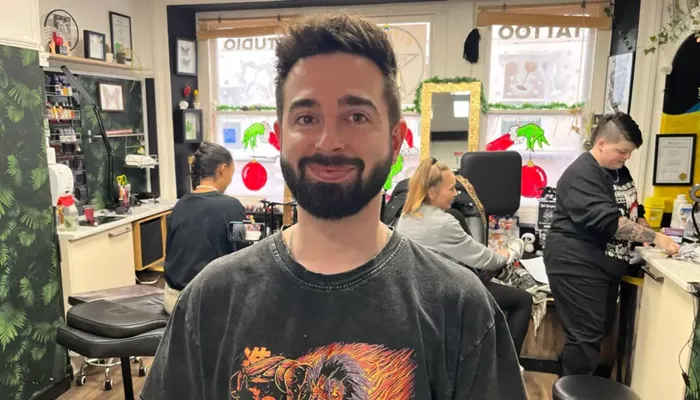A student from Guernsey is calling for a shift in how people perceive tattoos after facing online criticism for her body art.
Sammie Carre, 31, recently shared her experience of receiving negative comments after posting in a local Facebook group to find part-time work. The criminal law student said that while she received numerous supportive replies, she also encountered derogatory messages about her tattoos, including one that compared her to being “branded like an animal.”
Carre, who has a number of tattoos, explained that many of her tattoos are “memory tattoos,” including her first tattoo—a small butterfly on her stomach dedicated to her mother, which she got at age 16. Inspired by a legal drama during the COVID-19 lockdown, Carre began studying law at Kingston University. Over the years, she has added more tattoos to her arms, hands, and chest.
While home on Guernsey for the holidays, Carre posted a request for part-time work and inquiries about corporate sponsorships for law students. However, the response was not entirely positive. She was criticized for her appearance, with some comments labeling her a “scrounger” and a “criminal,” despite her clear intention to seek employment.
“I was in no way looking to scrounge or thieve,” Carre said, emphasizing that the post specifically sought part-time work. Due to the overwhelming negative feedback, she deleted the post. While she acknowledged some personal regret over visible tattoos on her hands, Carre felt the responses were unfair.
In Guernsey and the UK, tattoos are not protected under equality laws, meaning it is not illegal to discriminate against someone for having tattoos or ask them to cover them at work. However, Carre pointed to an attempt by a New York politician in 2022 to introduce a law against tattoo discrimination and expressed hope that the UK and Guernsey would follow suit in the future.
Local tattoo artist Adam Trump, owner of Ritual Tattoo Club in St Peter Port, noted that his clientele spans various walks of life. He believes the lingering stigma surrounding tattoos is partly rooted in historical perceptions.
Carre’s call for greater acceptance of tattoos reflects a broader conversation about body art, professionalism, and personal expression.
Related topics:

